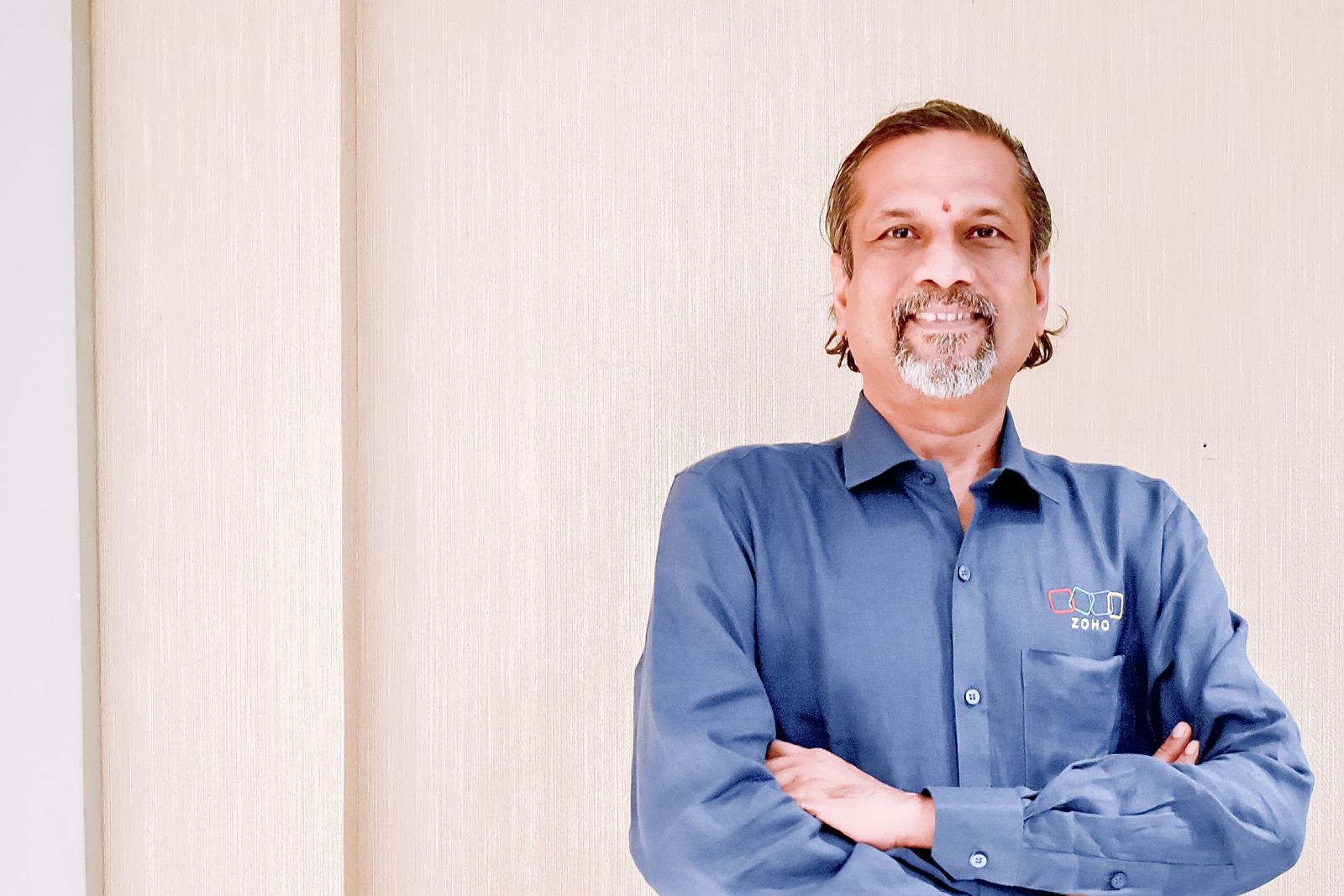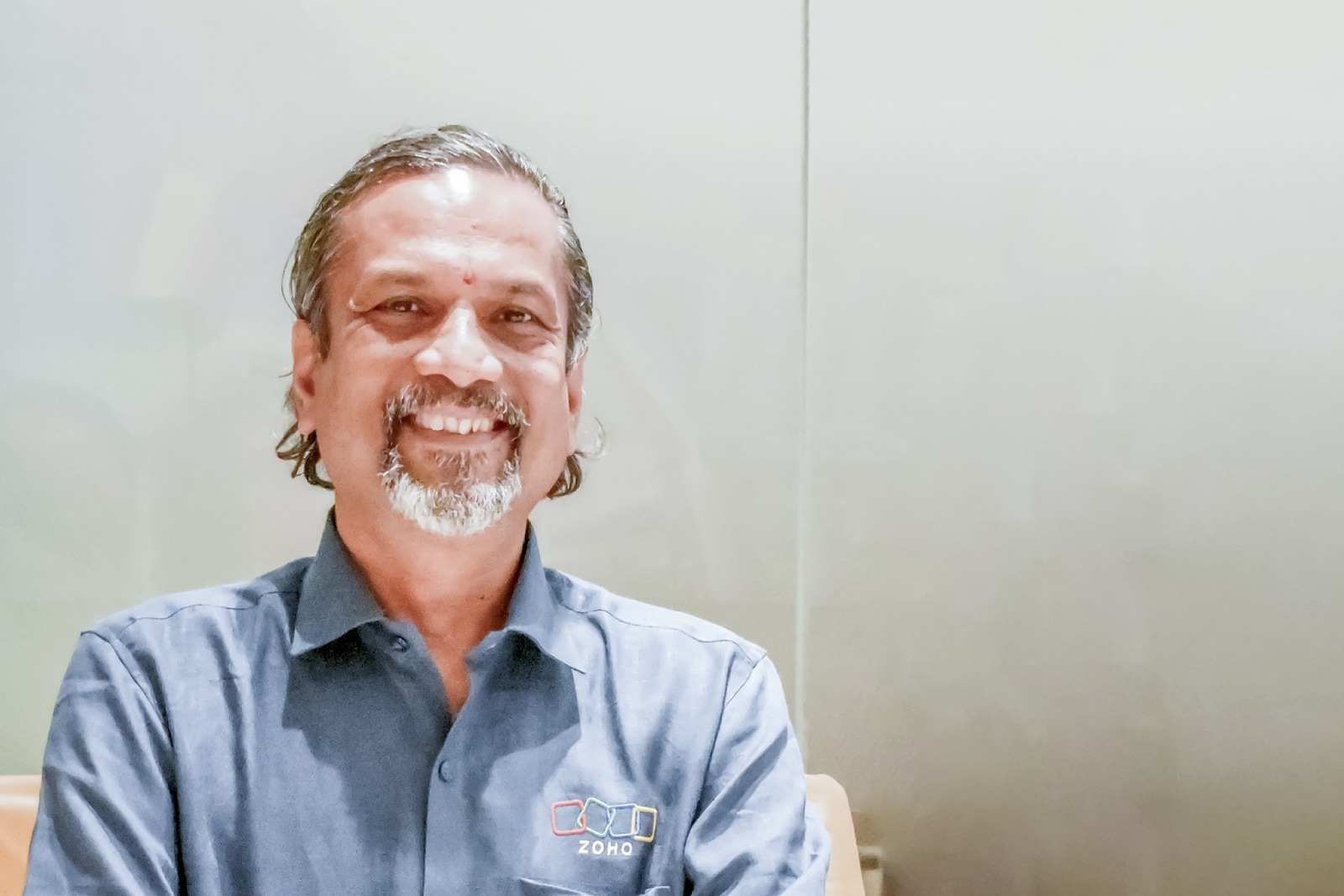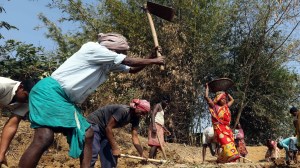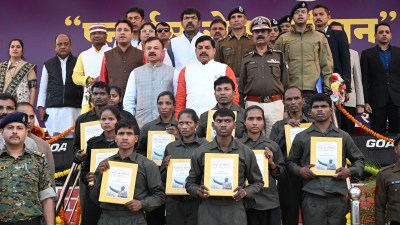It is not possible to replicate Silicon Valley everywhere: Sridhar Vembu, Founder and CEO, Zoho Corporation
Sridhar Vembu talks about his faith and confidence in rural India, the need to stop the brain drain, what Indian cities lack, and the trajectory of technology, innovation and impact in India.
 Many of Sridhar's social media posts are mainly on rivers, ponds, rainwater harvesting and agriculture, though Sridhar does talk about hard tech too. (Express photo by Jithendra M)
Many of Sridhar's social media posts are mainly on rivers, ponds, rainwater harvesting and agriculture, though Sridhar does talk about hard tech too. (Express photo by Jithendra M)Sridhar Vembu is known for his passion for rural India, and the confidence that billion dollar companies can be run from small towns.
The billionaire CEO and founder of Zoho Corporation, Sridhar mostly wears the Tamil traditional dress of ‘Veshti’ and is seen cycling in his village near the town of Tenkasi in Tamil Nadu, away from the hustle and bustle of any big city. The nearest small airport is around 100 km away.
Many of his social media posts are mainly on rivers, ponds, rainwater harvesting and agriculture, though Sridhar does talk about hard tech too. And when he does it takes a zen-like quality, as he says in his recent post, “When you work on hard tech problems, you have to get used to dry spells, frustrating times when nothing seems to work. My way to cope is to humbly acknowledge the dry spell, not fight it. That zero state proves vital. Then the spell breaks and a flood of ideas come.”
In 2019, he moved to Mathalamparai village, near the town of Tenkasi from where he manages Zoho with more than 15,000 employees worldwide and over 100 million users for his products.
Sridhar spoke to indianexpress.com on his faith and confidence in rural India, the need to stop the brain drain from there, what Indian cities lack, and the trajectory of technology, innovation and impact in India.
Edited excerpts:
Venkatesh Kannaiah: As someone who knows the issues in rural India, what do you think are a few tech interventions that can change the face of rural India?
Sridhar Vembu: I come from the perspective that all development needs to be locally driven and there is a huge talent pool in rural India which needs to be tapped to create a multiplier effect on the economy. The key is to invest in the talent in rural India and wait for the payback which is huge. We at Zoho have gained from such talent.
Tech can play a role, but I am more interested in jobs, livelihoods and creating the incentives to stay back in villages. Interventions should not also lead to unintended consequences. Say, for example, we have seen that good colleges in rural areas have unintentionally vacuumed out talent from rural areas and have pushed them to cities.
We certainly require tech infrastructure, and we now have decent internet connectivity in rural India, telecom investments, road connectivity, improvements in sanitation, but what I would like to see is more electric trains.
It is also about sequencing of these investments. The fundamental thing is to invest in value creation in rural India, it is then that talent would remain in rural areas and then any other investments have a chance to succeed. We need to sequence it properly.
I am working on Tenkasi district, and perhaps could focus on four or five more districts, but there is a need for wealthier Indians to adopt their districts and give it a focused development agenda. For Tenkasi, we have the Tenkasi Foundation, and it is being done by people like Ananthan Ayyasamy, a former engineering director at Intel, who returned back to Tenkasi after a flourishing career abroad. They are attracting startups and promoting the ecosystem.
 “There is a need for investments in public transportation and the whole issue is there is a need for a social consensus which seems to be lacking,” Sridhar said on tech interventions in Indian cities. (Express photo by Jithendra M)
“There is a need for investments in public transportation and the whole issue is there is a need for a social consensus which seems to be lacking,” Sridhar said on tech interventions in Indian cities. (Express photo by Jithendra M)
Venkatesh Kannaiah: What do you think Indian cities lack? What are a few tech interventions which can make life livable in Indian cities?
Sridhar Vembu: Well, work from home is the best tech intervention I can think of.
You must understand that the larger issue in Indian cities is not a tech issue. There is unconstrained growth of population in the cities due to migration from villages and this pushes up real estate prices and other attendant problems. You will not see ponds or lakes being encroached in villages. It is a city problem.
We need to manage the growth in population and demand for infrastructure, and this one car per person goal can never work in a place like India.
There is a need for investments in public transportation and the whole issue is there is a need for a social consensus which seems to be lacking. Governments, private sector and civil society need to work together. Take the case of floods in Chennai. Everyone overlooks the problem, and then the disaster happens. Tech can play a role no doubt, but the issue is that we take decisions when something big happens, and then we do not stick with the decisions. We let it pass.
Venkatesh Kannaiah: Can you tell us about a few of your investments and their potential social impact?
Sridhar Vembu: We are investors in some social impact startups. One of them is Gen Robotics, which provides robotic solutions in the field of sanitation. They have built the world’s first robotic scavenger and their Bandicoot Robot enters and cleans manholes, eliminating the need for sanitation workers to expose themselves to dangerous environments.
We are also invested in Zentron Labs which is into computer vision algorithms and it automates processes that require visual inspection. They are doing some interesting work in the agri sector with fruits and vegetables. Their tech is now being used in colour sorting, size sorting, weight sorting and defect detection of fruits and vegetables.
We are also invested in Voxelgrids Innovations, a healthtech startup which is revolutionising MRI scanning in India. Voxelgrids has developed a lightweight, affordable, and portable MRI scanner. This can take medical imaging to rural and remote parts of India and it reduces the costs dramatically.
We are also looking at companies in the 3D printing of homes for rural india, to bring down the cost of homes in rural india, and also startups in drone deliveries of medical supplies in rural india. These are in their very early stages.
Venkatesh Kannaiah: What is right and what is wrong with the Indian innovation ecosystem?
Sridhar Vembu: The things that are right are our ambitious youth, and the growing national pride with initiatives like Make in India and the feeling that India has arrived to take its place in the world apart from the success stories of India Stack and UPI. However, the big corporations should spend more on research and development and should also appoint scientists as CTOs. We need to have robust research and development personnel and that is where it will make a change. University or government R&D is useful for creating scientific breakthroughs but the vast majority of R&D is about contextual product and process refinement. Most of the innovation would come from the private sector, with governments building the basic infrastructure.
Venkatesh Kannaiah: Tech and social impact. Where do the triggers lie? Where should it meet and where could it diverge?
Sridhar Vembu: We create impact mostly by the way we operate, and the culture of the company. My reading is that tech should not worsen existing divisions. We have seen that in California and we have seen it in other places too. Wealth has to go around and create opportunities for the deserving.
For us impact comes from who you employ and where you employ. Income in rural areas circulates in the economy in a different manner than in urban areas, while in rural areas it raises quality of life all over. In urban areas we find that it gets allocated to paying huge rents, which are again outcomes of speculative activities. Ultimately, as consumers, we must understand that what we spend on creates a social impact and in rural areas the returns are better.
Venkatesh Kannaiah: What’s your take on tier 2 and tier 3 cities and towns becoming innovation hubs?
Sridhar Vembu: The capital we have in rural India is human capital and not financial capital. Capital even if available is not endless. We have to grow, and become profitable fast. And it needs to be reinvested. Every place in India cannot expect huge investments and we cannot replicate a Silicon Valley everywhere. Even in the US, places like Boston and South Carolina tried to replicate Silicon Valley, but they were not successful. That is the way that financial capital and tech talent works. They have their priorities.
Even in India, cities like Bengaluru get most of the investment. For tier 2 and tier 3 cities, it should not be a financial capital model, but a model where profitability should be the key and it should be reinvested in the same place. One should look at locally rooted solutions.
 On Artificial Intelligence, Sridhar says it “works both ways. It might amplify fake news. It also helps with tools to track fake news.” (Express photo by Jithendra M)
On Artificial Intelligence, Sridhar says it “works both ways. It might amplify fake news. It also helps with tools to track fake news.” (Express photo by Jithendra M)
Venkatesh Kannaiah: Is India as a society ready to face the AI storm? From fake news to job loss?
Sridhar Vembu: We have faced fake news before but its AI powered amplification is new. You must understand that AI works both ways. It might amplify fake news. It also helps with tools to track fake news. The challenge is not for AI taking away our jobs, but from the global economic slowdown which will have an impact on tech jobs in the country.
Venkatesh Kannaiah: Can we call you a techno optimist?
Sridhar Vembu: I see technology as a neutral tool. It is finally what we make of it as humans through our culture. I am an optimist in the sense that I am confident that people will find a way to navigate the challenges through their value systems.







